Nurses Learn Communications Strategies That Improve Patient Safety
by Jennifer Walker
A nurse sees her co-worker walk into a patient’s room without washing his hands or pulling on gloves and a gown. Root-cause analysis results show that 99 percent of patient errors occur because healthcare staff donÕt effectively communicate in these situations. But what is the best way for the nurse to bring the issue to her co-worker’s attention?
Since January 2009, Sibley Memorial Hospital has trained approximately 300 RNs to answer this question. In its Seven Crucial Conversations for the Healthcare Professional workshop, staff learn how to feel safe and respond appropriately when crucial conversations — with high stakes, high emotions, and/or differences in opinion — are necessary.
“[Staff] need to advocate for patients,” says Joan Vincent, RN, MSN, MS, MEA-BC, Vice President for Patient Care Services and Chief Nursing Officer. “If we don’t feel safe in the conversation, then sometimes I feel we don’t advocate as hard as we can.”
Through the generosity of Prince Charitable Trusts, the one-day workshop is led by seven nurse facilitators — a combination of managers, researchers, staff nurses, and education and training specialists — who were trained by the communications company VitalSmarts.
Lead nurse trainer Patty Haresign, RN, B-C, MS, an education and training specialist with the hospital, says that the first step is teaching staff to be aware of crucial conversations. “[We] have to be able to recognize [them] and sort of step back and really look at the content of what we’re saying,” she says.
Staff also learn to recognize the feelings they bring to the conversation and to listen to other sides of the story, all while staying focused on — and quickly resolving — the central issue at hand. “In healthcare you have to be able to speak to somebody spontaneously,” says Haresign. “If you can state facts and not worry about the emotions, you can really get to the point of what you need.”
On surveys distributed after the work-shop, staff members said they feel more comfortable having crucial conversations with their colleagues. They’ve also learned to think before they react.
But Haresign points out that it’s diffi-cult to follow all of the workshop’s com-munications strategies at once. “We tell [attendees], ‘Go out and begin with one or two skills,'” she says. “These skills only really become part of you with practice.”
To learn more about the Crucial Conversations program at Sibley Memorial Hospital, contact Sandra Laski, RN, or Patricia Haresign, RN, at [email protected].
